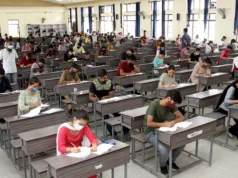
Students have suffered as a result of the fast-paced, competitive environment of contemporary education. As a result, they now have mental health issues that need to be addressed right away and consistently. According to a 2023 World Health Organization report, over one-third of students suffer from anxiety and despair. This illustrates the pervasive effects of stress in the classroom.
Over the past ten years, there has been a rise in student suicides in India. According to a 2024 study by the National Crime Records Bureau (NCRB), the number of male student suicides has increased by 50%, while the number of female student suicides has increased by 61%.
These trends underline the need for providing mental health as part of the educational experience. Mental well -being and training could not only prove beneficial to academic success but also improve emotional resilience, boost creativity, and impact life-long satisfaction.

Experts explain how a student’s experiences in a mental health education program could teach them important skills for growth. According to Dr. Arvind Otta, a senior psychologist and mental health activist, mental health education is essential since all kids experience emotions and difficulties in school, which they must learn to comprehend and control. In terms of mental health, it can assist reverse prospective issues by fostering resilience, combating stigma, and promoting prevention through early intervention.
A kid can flourish academically, socially, and emotionally as a result of these encounters. The development of pressure management skills becomes essential in an educational system that pushes pupils to achieve better than their peers.” Skills like self-control, attention to detail, and other abilities that can encourage assertive communication to prevent peer confrontations can be acquired through mental health education. According to Dr. Otta, this strategy can also assist in getting professional assistance when needed.
The digital era and access to technology have democratized access to mental health education. This technology could prove to be the means used to bridge the gap in access to mental health services.
It can be used to normalize and de-stigmatize discussions about mental health issues. According to Dr. Otta, “mental health education can reject very naive notions of mental health, such as “treatment is exclusively for severe difficulties” or “mental health disorders are symptoms of weakness.” It backs up the claims that mental health treatment is necessary and that people should get help when they need it.
Prioritizing the mental health of students is crucial for educational institutions. Educational institutions must provide their students with supportive settings by encouraging open communication, qualified teachers, and easily accessible materials.









